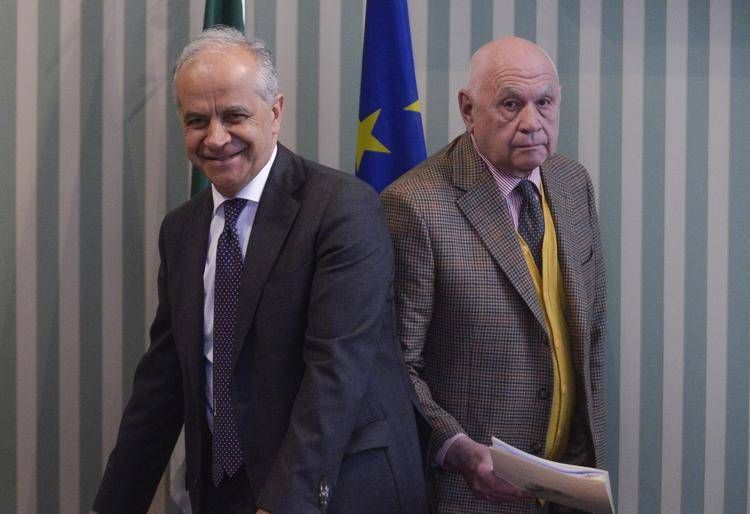Ministers Defend Almasri’s Release Amid Legal and Political Controversy
On Wednesday, Italy’s Justice and Interior Ministers, Carlo Nordio and Matteo Piantedosi, addressed the Italian Parliament about the controversial case of Almasri, the Libyan judicial police chief involved in crimes against humanity, who was arrested in January by Italian authorities but later released and sent back to Libya. While both ministers defended their actions, Nordio’s explanation raised concerns, especially regarding procedural irregularities and his delayed response to the arrest. The ministers denied that the release was due to political pressure or to maintain relations with Libyan authorities, although such speculations are widespread due to Italy’s interests in Libya. The opposition criticized the ministers’ handling of the case, suggesting political motivations behind Almasri’s swift repatriation. Nordio’s critiques of the International Criminal Court (ICC) and his claims about procedural errors in the arrest warrant sparked further debate, especially as it became clear that the Italian government had prior knowledge of the situation. Despite the government’s defense, questions remain regarding the decision to release Almasri and the legal inconsistencies in the case.
Helicopter Crash in Parma Claims Three Lives, Including Lorenzo Rovagnati
A civilian helicopter crashed at around 7:20 PM in Castelguelfo, a village in Noceto, near Parma, killing all three people on board. Among the victims is 41-year-old Lorenzo Rovagnati, CEO of the famous Italian cured meat company, whose name was confirmed by rescue sources. The crash occurred within the grounds of the Castelguelfo Castle, owned by the Rovagnati family, and the cause of the incident is still under investigation. Thick fog in the area may have played a role, but it is unclear whether the helicopter fell during landing or takeoff. Emergency responders and authorities are working at the scene, and the National Agency for Flight Safety has launched an investigation into the cause of the crash.
Lombardy’s Unused ICU Beds: A Wasteful Legacy of the Pandemic
The Lombardy Region’s purchase of intensive care unit (ICU) beds during the 2020 COVID-19 crisis has led to a major waste of resources, with over 200 beds still sitting unused in the abandoned Sant’Anna Hospital in Como. These beds, bought for €222,000, were intended to help Italy’s overwhelmed ICUs, but due to certification issues, they were never put into service. Despite a legal dispute with the Indian supplier, Surgimill Medical Systems, over missing certifications, the beds remain stored in a disused hospital wing. The Region is now considering donating them to Ukraine for its war efforts, as the country has requested ICU beds for the wounded, though negotiations with the supplier are ongoing. Lombardy officials have been criticized for this mismanagement of resources during the height of the pandemic.
Genova Trial for 1996 Murder of Nada Cella Begins After Cold Case Breakthrough
The trial for the 1996 murder of Nada Cella, a 24-year-old woman found beaten to death in her office in Chiavari, began in Genova on Thursday. Anna Lucia Cecere, a former teacher, is accused of aggravated voluntary manslaughter, while Marco Soracco, the accountant where Cella worked, and his mother, Marisa Bacchioni, face charges of aiding and abetting and false testimony. Initially dismissed in 1998 due to insufficient evidence, the case was reopened in 2021 when geneticist Antonella Delfino Pesce uncovered new clues, including matching buttons and DNA profiles, leading to Cecere being reconsidered as the murderer. The trial has faced legal hurdles, including challenges to the constitutionality of the proceedings under Italy’s recent judicial reforms, with a ruling pending on whether the case should be suspended.
January 2025 Marks Hottest Month on Record, Warns Copernicus
January 2025 set a new global temperature record, with an average surface air temperature of 13.23°C, 0.79°C higher than the 1991-2020 average. According to Copernicus, the European Union’s space program, this marked the 18th out of the last 19 months with global temperatures exceeding 1.5°C above pre-industrial levels. Despite temporary cooling effects from La Niña in the tropical Pacific, the past year has been 0.73°C above the 1991-2020 average. In Europe, temperatures were 2.51°C above the long-term average, particularly in the southern and eastern regions. Other parts of the world, including parts of Canada, Alaska, and Australia, also saw higher-than-average temperatures. Meanwhile, ocean surface temperatures reached 20.78°C, the second-highest recorded for January. Copernicus continues to monitor oceanic temperatures and their impact on the global climate throughout 2025.

